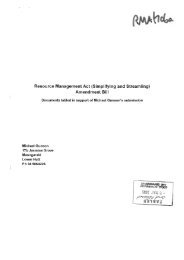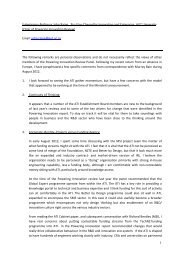Parliamentary Debates (Hansard) - New Zealand Parliament
Parliamentary Debates (Hansard) - New Zealand Parliament
Parliamentary Debates (Hansard) - New Zealand Parliament
Create successful ePaper yourself
Turn your PDF publications into a flip-book with our unique Google optimized e-Paper software.
3754 Local Government (Auckland Council) Bill 16 May 2009<br />
foreshorten the time for the bill to be at the select committee, but that is something that<br />
will have to be done at the next sitting. The member very, very clearly moved<br />
something. It is something that the House should address. No other Minister gets a<br />
second chance to get a motion right, and there should not be an exception for this one.<br />
Hon RODNEY HIDE (Minister of Local Government): I do apologise to the Hon<br />
Trevor Mallard. I did make a mistake, Mr Assistant Speaker. But I point out that the<br />
actual motion had not been put. You quite rightly corrected me, I moved the motion<br />
again, and that motion is now on the floor.<br />
Hon DARREN HUGHES (Senior Whip—Labour): The point is, Mr Assistant<br />
Speaker, that you called the Minister, he moved the motion, he sat down, and his call<br />
was finished, just as Mr Mallard pointed out. Further, in support of what Mr Mallard<br />
has put to you, I say that there is a direct precedent for this. It happened in the last term<br />
of <strong>Parliament</strong> with a justice bill, when the Minister failed to move the correct referral<br />
motion at the end. On that occasion it was not pointed out by the Clerk. The Minister<br />
realised the motion was not correct moments after the question had been put and before<br />
the vote had been taken. The Hon Dr Nick Smith raised a point of order on it. That will<br />
be clear in the <strong>Hansard</strong> record. The Government paid the price for it, and had to come<br />
back subsequently with a procedural motion to clean matters up. There is nothing we<br />
can do about this. The motion was moved by the Minister, and he resumed his seat—it<br />
is over. You are now bound, Mr Assistant Speaker, to put that motion to the House to be<br />
voted on.<br />
Hon JOHN CARTER (Associate Minister of Local Government): The point that<br />
needs to be made is that there is a significant difference in this particular case. Although<br />
it was true that the Minister of Local Government had resumed his seat, nevertheless,<br />
you asked—and you are in sole charge of this House—the Minister to complete the<br />
motion, which he continued to do. Nothing intervened after the time that he made the<br />
comments, and, as a consequence, the House certainly can consider the motion as a<br />
whole. At the end of the day, you are the final judge, but given that you invited the<br />
Minister to continue the motion—which he did—and complete it, the House can<br />
consider it.<br />
Hon TREVOR MALLARD (Labour—Hutt South): I think it is a fairly simple<br />
point. Mr Assistant Speaker, you were acting on advice, and I accept that, but in this<br />
particular case I think you were not correctly advised. It is not often that I disagree with<br />
someone who sits in the Clerk’s chair, but when a member has completed his speech<br />
and resumed his seat it is all over, Rover. That is the case that occurred.<br />
It is not something that is irredeemable. The Government essentially has a choice: it<br />
can adjourn now and move the referral motion again as a Government order of business<br />
on the next sitting day, or it can put the original motion, and then, sometime over the<br />
next few months, pass a motion that returns the situation back to what the Government<br />
wants. Clearly, we will vote against it, but it is not something that we will obstruct, as<br />
long as it is done properly, within the procedures of the House.<br />
The ASSISTANT SPEAKER (Hon Rick Barker): I think the situation is relatively<br />
straightforward. There is no doubt that the motion put initially by the Hon Rodney Hide<br />
was different from the motion that he had signalled to the House in his first reading<br />
speech. The first thing is that he had signalled clearly to the House that there would be a<br />
referral motion and that there would be a report-back date. He is therefore obligated,<br />
when he comes to move the motion, to move the same motion. I would draw a parallel<br />
with the situation when members put down questions for oral answer; members are<br />
required to ask the exact question that is on the Order Paper.<br />
The second point I would make in this regard is that the motion had not been carried<br />
by the House. Before I put the question, I invited the Minister—on the advice of the






![Full evidence text [PDF 8908k] - New Zealand Parliament](https://img.yumpu.com/14025494/1/184x260/full-evidence-text-pdf-8908k-new-zealand-parliament.jpg?quality=85)
![−3 JUN 2009 IRELEASED] - New Zealand Parliament](https://img.yumpu.com/12829724/1/185x260/3-jun-2009-ireleased-new-zealand-parliament.jpg?quality=85)
![Full paper text [PDF 3515k] - New Zealand Parliament](https://img.yumpu.com/11267192/1/184x260/full-paper-text-pdf-3515k-new-zealand-parliament.jpg?quality=85)


![Full evidence text [PDF 9k] - Parliament](https://img.yumpu.com/7938085/1/184x260/full-evidence-text-pdf-9k-parliament.jpg?quality=85)





